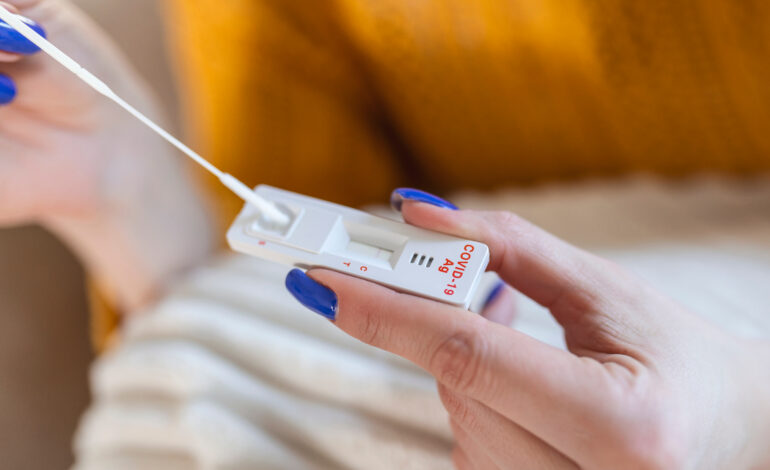LANSING — The state has launched a program to make free at-home COVID-19 tests available to families through schools.
On Thursday, Governor Whitmer launched a new pilot program in partnership with the Michigan Department of Health and Human Services (MDHHS) called “MI Backpack Home Tests” to provide free, at-home COVID-19 antigen tests to participating schools to tackle the ongoing pandemic as K-12 students, parents, teachers and support staff continue in-person activities.
“We must use every tool in our toolbox to keep kids safe and ensure that they can continue learning in person this school year,” Whitmer said. “With the MI Backpack Home Tests program, we can help protect students, parents, teachers and school staff by providing free tests directly to Michigan families. While these tests will help keep people safe, the best thing anyone can do to protect themselves and ensure safe, in-person learning is to get vaccinated. I urge all parents to take their children ages 5 and up to get a safe, effective vaccine.”
Metro Detroit schools and Michigan in general have been dealing with continued COVID-19 cases and outbreaks as the state approaches the holidays. The state reported 87 school-related new outbreaks, down slightly from last week’s 104. In Ann Arbor, public school officials ordered buildings to be closed on Monday and Tuesday next week due to an “an alarming increase in staff and student COVID-19 cases.”
The D7 school district in Dearborn Heights said it will return to virtual learning temporarily because of an uptick in COVID-19 cases.
The MI Backpack Home Tests initiative is kicking off this week in two school districts, Charlotte Public Schools and Battle Creek Public Schools. Through the voluntary program, parents, students and staff can sign up to take home COVID-19 test kits. Additional school districts – including Benton Harbor Area Schools, which has already signed up – will be added into the pilot program in later weeks and receive their test kits after the Thanksgiving break.
Every person enrolled in the program receives one at-home COVID-19 test kit that includes two tests. The MDHHS will provide the kits and educational materials, and schools will distribute the kits to participants.
“This pilot offers one more tool to keep our school communities safe,” said Dr. Natasha Bagdasarian, Michigan’s chief medical executive. “Along with the safe and effective vaccine, in-school testing, mask wearing, ventilation, social distancing and handwashing, take-home testing allows schools to educate our children safely during the pandemic.”
The MI Backpack Home Tests program expands on the MI Safe School Testing Program launched by the MDHHS in January.
“MDHHS is committed to looking for innovative ways to protect the public health during this pandemic,” said Dr. Alexis Travis, senior deputy director for the MDHHS Public Health Administration. “The MI Backpack Home Tests program is another tool we can use to combat COVID-19.”
The initial program begins in Charlotte and Marquette schools when they receive materials this week. During the first week of the pilot, schools send information to parents and staff and collect registration forms from those who chose to participate. The MDHHS will ship kits to schools to distribute to participating students and staff next week. Once they have their test kits, participants can use the kits at home if someone has symptoms or exposure to someone else with COVID-19.
“Governor Whitmer has consistently been a voice for educators and students and has fought for COVID safety precautions to keep our communities healthy,” said David Hecker, president of AFT Michigan. “This home testing program will help parents make informed decisions and help keep students and educators safe and healthy so we can keep kids in the classroom.”
The MDHHS is inviting a geographically diverse group of schools to participate in the pilot so that its effectiveness can be gauged around the state.
According to Richard Martinello, MD, a Yale Medicine infectious diseases specialist, it’s a good assumption that home tests are not as accurate as tests one can get at a drive-through or walk-in testing site, but they do improve access to testing. Yale doctors also say antigen tests are cost effective and fast, compared to other methods, for school settings where it is important to know whether a child is infectious at the present moment.
But unlike “molecular testing”, which requires specialized lab equipment, antigen tests require a higher level of virus in the test sample before the test will turn positive. This means that an antigen test may sometimes lead to a false negative.
To offset the decreased sensitivity, the FDA recommends taking multiple tests over several days to improve the chance of catching asymptomatic infections.






Leave a Reply